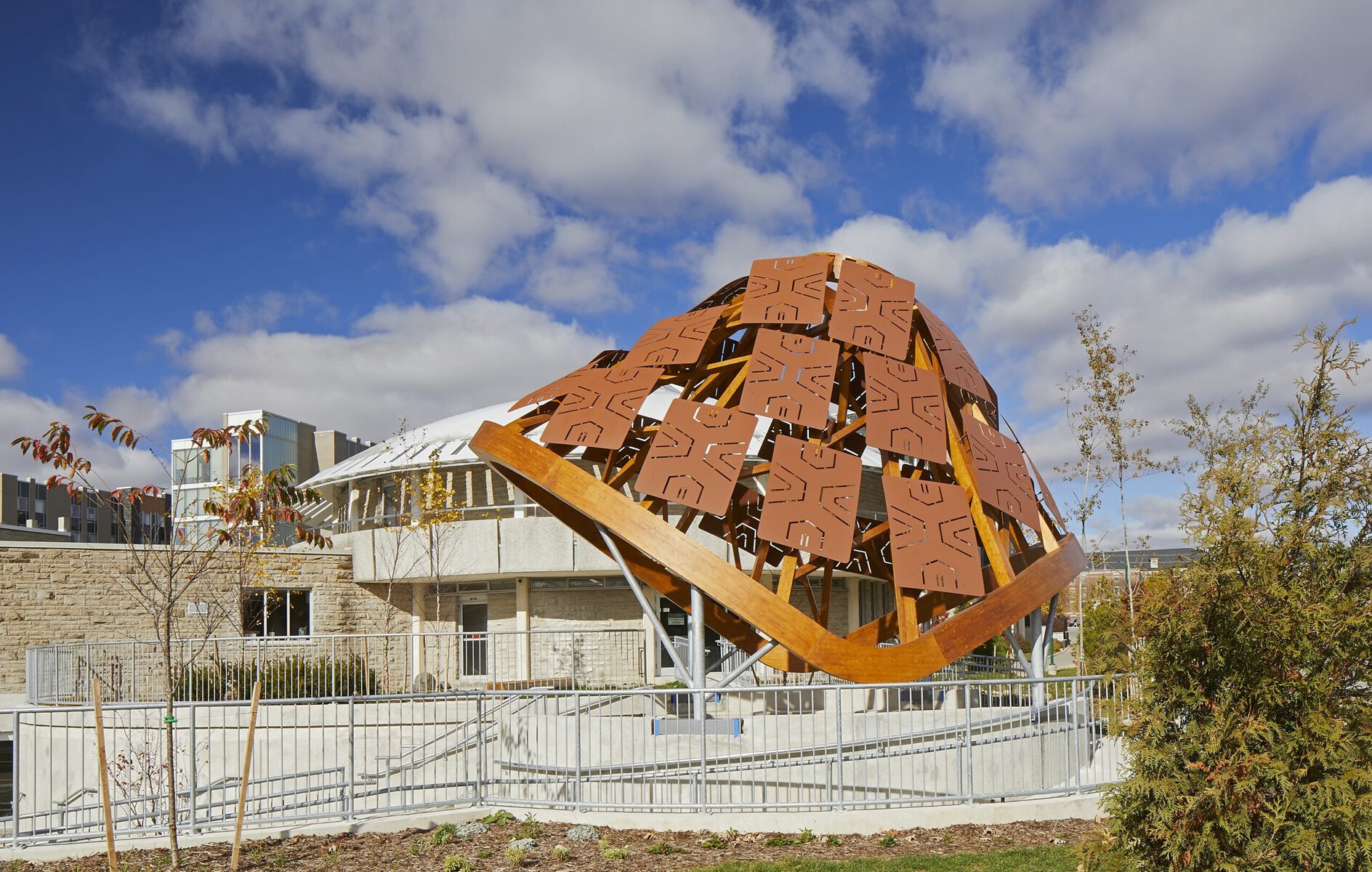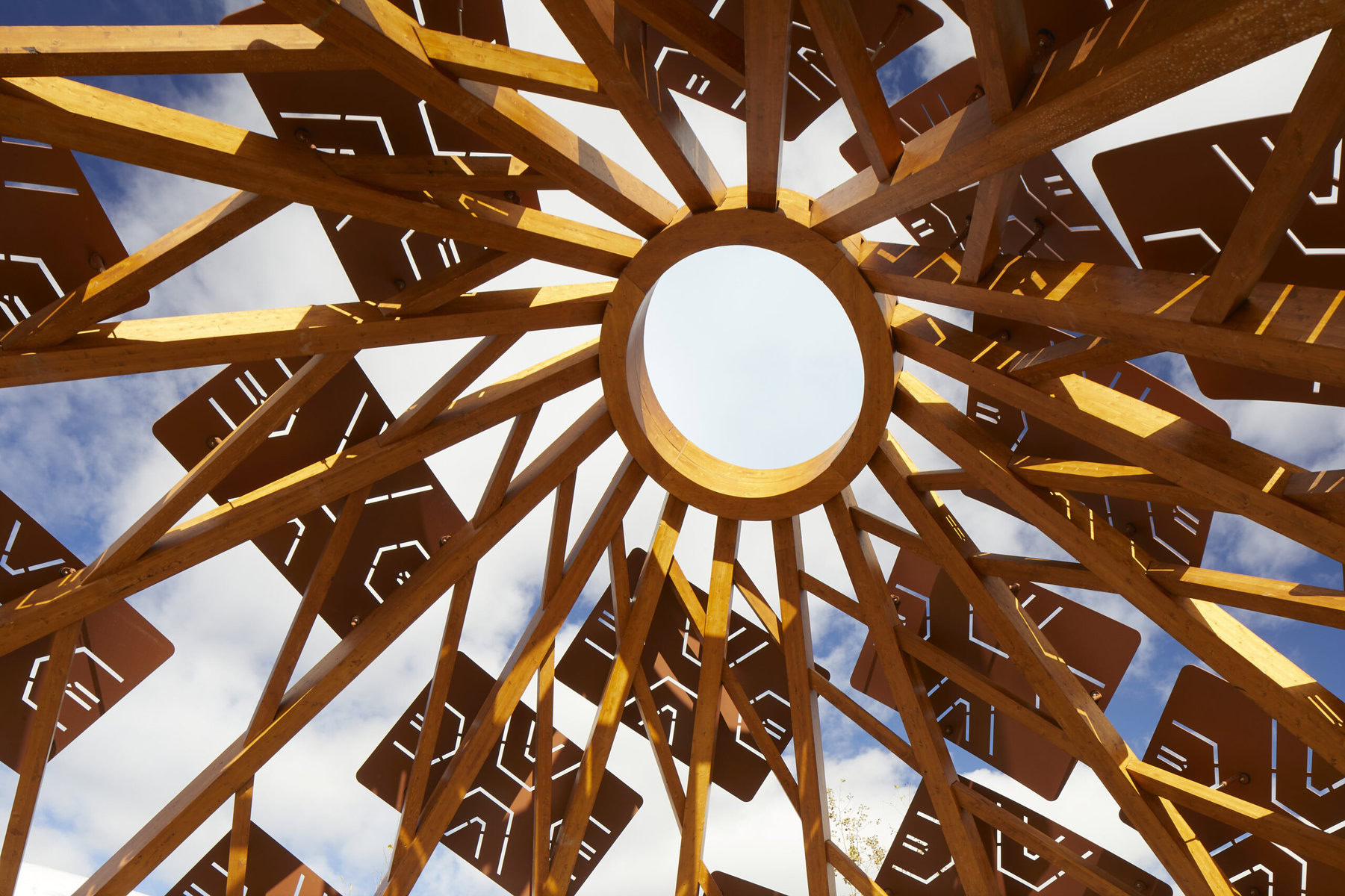When you walk into the Indigenous Outdoor Gathering space at Lambton College in Sarnia, Ontario, it’s hard to know whether you have landed in the past or in the future. One might wonder if the round building is a traditional healing space, with its wigwam-like structure and an open fireplace in its center, or an innovative, contemporary art project, with its glass ceiling and metal bands that resemble ancient basket weaves. Buffalo, birds and other native animals are drawn onto the ceiling and glass walls; paw prints walk up the sides. The pavilion melds past and future to host sweat lodges, cultural teachings, pow pows and ceremonies for people in the present.
“The cultural content is layered in this building,” architect Wanda Dalla Costa explains. “It’s over the top, because we need to overcome the invisibility of our culture and push so far through.”
Dalla Costa, a member of the Saddle Lake Cree Nation and Canada’s first First Nations female architect, seeks to innovate contemporary architecture by integrating the rich history of Native culture. She calls herself a “double underdog,” being female and a minority in architecture, but believes the perspective adds strength: “I’ve learned to deeply listen to underserved voices.”
Her path into architecture is as unusual as her buildings. She became interested in construction and urban planning when she started traveling around the world in 1990. Instead of one gap year as planned, she ended up backpacking for seven years through 40 countries, including Australia, New Zealand, Asia and Latin America. “Visiting the Angkor Wat temples in Cambodia or seeing wall reliefs in India, which describe the entire history of the people, I noticed how visible people’s traditions still were in buildings. I thought to myself, the little boxes we have here in North America have nothing to do with our culture. There is such a disconnect. Why couldn’t we uplift visibility using the tool of architecture?”
In 2016, she founded the community-driven Indigenous Design Collaborative at Arizona State University in Tempe, and her firm, Tawaw Architecture Collective, specializes in developing solutions for tribal communities. In her native Cree language, Tawaw means “welcome.”
“It means welcome in the broadest sense, welcome to my house and to everything in it,” Dalla Costa explains. “It’s an expression of hospitality.”
Crushed by negative news?
Sign up for the Reasons to be Cheerful newsletter.
When she takes on a project, she is looking for people “willing to go on a journey of exploration, disruption and rethinking.” From the outset, she holds listening sessions with the community and works with Indigenous knowledge holders, local community members and design professionals “to figure out all the pieces and parts.”
Speaking from her office in Tempe, Arizona, with vibrant artwork depicting Indigenous women on her white office walls, she reflects on her design principles, her “Indigenous design triad”: “Buildings should always reflect the identity of the people as well as the social norms and cultural lifeways.”

Growing up in Edmonton in Alberta, Canada, as the daughter of an Italian father and a Cree mother, Dalla Costa and her sisters visited her mother’s family on the Saddle Lake Cree reservation on weekends and vacations. She loved riding horses there and “running wild with our cousins on the rez,” but she was not introduced to her mother’s native language or ceremonies. “Back in the city, being Indigenous was kind of a taboo, and we would try to blend in, also because of the brainwashing my mother had undergone in residential school,” she says. Residential schools, usually boarding schools run by Christians, were rife with abuse and regularly punished Indigenous children for speaking their native language or displaying native culture.
Dalla Costa’s mother worked as a correctional officer in a high-security jail before she rediscovered her native heritage and changed course. She relearned her own culture and then began teaching it. “When she did, she created an opening for all of us,” Dalla Costa says. “This is why we are in repair mode and reconnecting as much as we can because there was this big interruption with my mom’s generation and earlier generations.”
In her designs, one literally sees how she tries to accomplish this reconnection. “Ways of connecting people should be our primary aim in creating built environments,” she said in conversation with other female Indigenous architects. “How are we providing spaces for people to come together, share, nurture and support each other?”
For instance, when she was asked to redesign the Indigenous Learning Research Centre at the Western University in Ontario, she opened up the interior space to connect with the outdoors. She installed an herbal garden, created a round space for ceremonies and gatherings, and integrated Indigenous culture by drawing inspiration from symbols like the turtle. The roof now resembles a curved mushroom cap, with Indigenous symbols cut out of metal sheets.
“If you look at the worldview of Indigenous people, there is this close kinship relationship to nature, so let’s tread lightly on the land and use the gifts of Mother Nature as much as possible,” she says. “Once you do that, you get much closer to sustainability in its truest form. Rather than adding complexity to a building, I think it’s really about simplifying it and increasing our understanding of what it means to live in close association with nature.”

When she studied architecture at the University of Calgary, she found that “Indigenous design was virtually unheard of.” After completing her studies, including a master’s in City Design at the Southern California Institute of Architecture and a Bachelor of Arts in Sociology and Native Studies at the University of Alberta, she spent years working for other architecture firms while developing insights into Indigenous design principles and giving workshops, before starting Tawaw five years ago “to show what it looks like in a more robust way.”
From affordable housing projects on reservations to a parking garage in Phoenix, her work has been buoyed by a renewed interest in Indigenous culture, coupled with a focus on climate resiliency and sustainability. “People are starving for wisdom on this subject,” she says. “The more climate chaos comes to us and to the unsettled nature in some of our urban spaces, the more important this work becomes.” Her passion is working with students, including a new generation of Indigenous people. Dalla Costa often takes her students with her to visit reservations and learn about the culture and needs of its residents. At Arizona State University, such efforts will culminate in a newly created masters in Indigenous placemaking and design that will launch this fall.
Dalla Costa’s vision goes beyond designing individual buildings. She views her designs as “seeds that we plant now for future generations, ideally embedding Indigenous principles in regulatory frameworks of city planning,” she says. “That’s really the next stage of development in rethinking urban environments, you know, set the values, set the principles, set the inspirations, and then let the creatives, the architects, the developers and planners get to work and find a way to bring this home.” She hopes the city of Tempe will vote to implement Original Peoples Design Principles, which include honoring ancestral presence and culturally significant sites, in its urban planning.
Dalla Costa’s ultimate goal is no less than “decolonizing urban spaces, to change the discourse in a city, to productively disrupt the prototype to make it more responsive to culture, with a focus on nature and a focus on bringing people together that not only benefits Indigenous people, but serves everyone from every walk of life.”
The post How Architecture Can Make Indigenous Traditions Visible appeared first on Reasons to be Cheerful.




